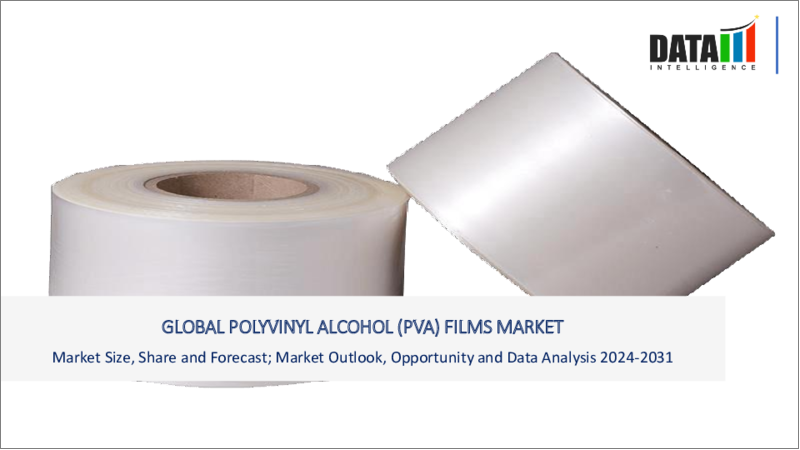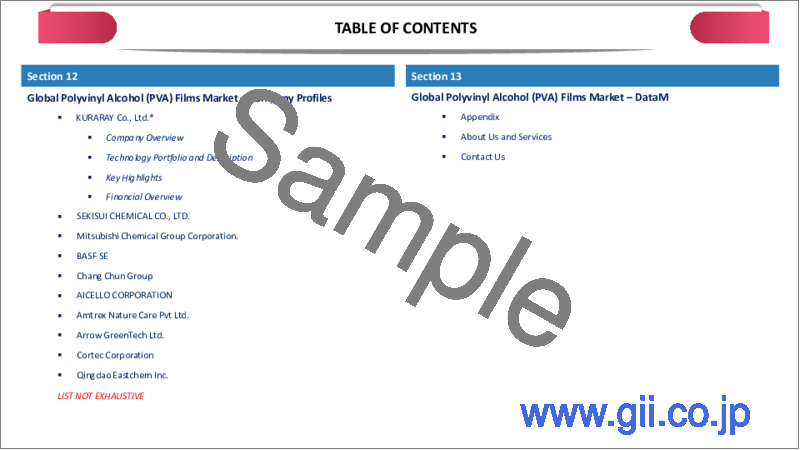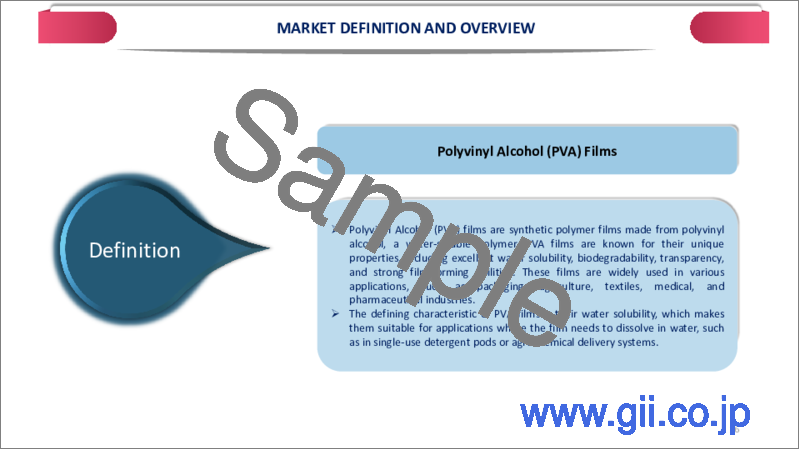|
|
市場調査レポート
商品コード
1489468
ポリビニルアルコール(PVA)フィルムの世界市場-2024-2031Global Polyvinyl Alcohol (PVA) Films Market - 2024-2031 |
||||||
カスタマイズ可能
適宜更新あり
|
|||||||
| ポリビニルアルコール(PVA)フィルムの世界市場-2024-2031 |
|
出版日: 2024年06月05日
発行: DataM Intelligence
ページ情報: 英文 180 Pages
納期: 即日から翌営業日
|
- 全表示
- 概要
- 目次
市場概要
ポリビニルアルコール(PVA)フィルムの世界市場は、2023年に4億2,900万米ドルに達し、2024年から2031年にかけてCAGR 6.7%で成長し、2031年には7,207億米ドルに達すると予測されています。
グリーンで持続可能な包装オプションに対する需要の高まりが重要な要因です。環境問題への関心の高まりやプラスチックの使用に対する厳しい制限から、生分解性や堆肥化可能な素材を求める動きがあります。PVAフィルムは水溶性で生分解性があるため、特に飲食品、医薬品、パーソナルケア分野において、従来のプラスチックフィルムに代わる魅力的な選択肢となりつつあります。
PVAフィルム製造の改良と技術的躍進が、業界拡大の原動力となっています。PVAフィルムメーカーは、素材の品質と機能性を高めるための研究開発に資金を費やしており、これによって様々な用途への適用性が高まることになります。フィルムの強度やバリア性、さまざまな添加剤との相性を向上させることで、PVAフィルムの用途はさまざまな分野に広がっています。
ポリビニルアルコールフィルムの世界市場において、アジア太平洋は市場の1/3以上を占める成長地域のひとつです。ポリビニルアルコールフィルムは、その順応性の高い品質と環境に配慮した信頼性により、さまざまな分野で包装用としてより一般的な選択肢となりつつあります。同地域では中間所得層が増加し、可処分所得が増加しているため、PVAフィルムの包装用途への需要が高まっています。
市場力学
持続可能性への関心の高まり
塩素のようなハロゲンを含まず自然に分解するポリマーやポリビニルアルコールフィルムは、洗剤の使い捨て包装に利用されています。ポリビニルアルコールフィルムは、一般的なプラスチックフィルムのように有害な化合物に分解されることはないです。洗濯中に汚れたり汚染された衣類を保持するための生分解性で水溶性の方法を提供するランドリーバッグの製造は、PVAフィルムのもう一つの用途です。
例えば、2023年には、多国籍化学企業のBASF SEがインドネシアのメラクにポリマーディスパージョンの生産施設を拡張しました。大手紙・板紙メーカーがASEANに拠点を置いており、その拡張は高級包装の需要増に対応するのに役立ちます。この拡張により、BASFは業界のリーダーとして、また信頼できる供給元としての地位を強化しています。
水性および生分解性製品に対する需要の高まり
ポリビニルアルコール(PVA)フィルムの市場は、生分解性製品に対する需要の高まりに大きく影響されており、生産者は持続可能な代替品を導入するようになった。世界的にプラスチック使用規制が強化され、顧客のエコロジー意識が高まるにつれて、持続可能な包装オプションの人気が高まっています。PVAフィルムは水溶性で生分解性があるため、特に食品や医薬品の包装など、使い捨て包装が一般的な業界では、従来のプラスチックフィルムに代わる有力な選択肢となります。
例えば、バイオプラスチックス・インターナショナルは2022年9月、サトウキビのアルコールから製造した初の水溶性PVAを開発し、化石燃料の需要を削減しました。さらに、コーテックは2022年5月にEcoSolを発表しました。EcoSolは、袋やパウチを必要な場所に捨てるだけで、水がPVAフィルムを分解して中身を放出するため、製品の塗布が非常に簡単になります。
耐熱性が低い
耐熱性の低い素材は、高温により溶融、変形、劣化し、構造崩壊や機能喪失につながる可能性があります。この制約から、高温性能が不可欠な一部の工業プロセス、自動車部品、航空宇宙機器には利用できないです。耐熱性の制限は、商品やシステムの安全性にも影響を及ぼす可能性があります。
例えば、耐熱性の低い材料で作られた電気部品は、電流や外部からの影響により高温にさらされると発火する可能性があります。耐熱性の低い材料は、強い熱を受けると有害物質が漏れたり変形したりする可能性があるため、食品包装や調理器具の分野で調理や電子レンジ加熱の用途に使用することはできないです。
原料価格の変動
PVAメーカーは、原料価格の変動により大きな困難を抱えています。酢酸と酢酸ビニルモノマー(VAM)は、PVAフィルムの製造に使われる2つの基本原料だが、需給の動き、地政学的不安、為替レートなどが原因で価格が変動しやすいです。
原料価格が突然上昇する可能性があり、PVAフィルムの製造コストに大きな影響を与え、生産者の利益率を低下させる可能性があります。市場の拡大も、原料価格の不安定さによって妨げられ、事業者が製造コストを正確に予測し、利益を維持することが難しくなっています。
目次
目次
第1章 調査手法と調査範囲
第2章 定義と概要
第3章 エグゼクティブサマリー
第4章 市場力学
- 影響要因
- 促進要因
- 持続可能性への関心の高まり
- 水性および生分解性製品に対する需要の高まり
- 抑制要因
- 耐熱性の低さ
- 原料価格の変動
- 影響分析
- 促進要因
第5章 産業分析
- ポーターのファイブフォース分析
- サプライチェーン分析
- 価格分析
- 規制分析
- ロシア・ウクライナ戦争影響分析
- DMIの見解
第6章 COVID-19分析
第7章 タイプ別
- 水溶性PVAフィルム
- 偏光PVAフィルム
- 非偏光PVAフィルム
第8章 グレード別
- 完全加水分解
- 部分加水分解
- 極一部分加水分解
- 低発泡グレード
第9章 用途別
- 洗剤包装
- 食品包装
- 工業用洗剤
- 消費者用洗剤
- 農薬包装
- ランドリーバッグ
- 刺繍用
- その他
第10章 地域別
- 北米
- 米国
- カナダ
- メキシコ
- 欧州
- ドイツ
- 英国
- フランス
- ロシア
- スペイン
- その他欧州
- 南米
- ブラジル
- アルゼンチン
- その他南米
- アジア太平洋
- 中国
- インド
- 日本
- オーストラリア
- その他アジア太平洋地域
- 中東・アフリカ
第11章 競合情勢
- 競合シナリオ
- 市況/シェア分析
- M&A分析
第12章 企業プロファイル
- Aicello Corporation
- 会社概要
- 製品ポートフォリオと説明
- 財務概要
- 主な発展
- Huizhou RD Plastic Co.,Ltd
- Arrow GreenTech Ltd.
- Mitsubishi Chemical Group Corporation
- Kuraray Co., Ltd.
- Cortec Packaging
- Sekisui Chemical Co., Ltd.
- Chang Chun Group
- Dow
- Anhui Wanwei Group Co.,Ltd
第13章 付録
Market Overview
Global Polyvinyl Alcohol (PVA) Films Market reached US$ 429.0 million in 2023 and is expected to reach US$ 720.7 billion by 2031, growing with a CAGR of 6.7% during the forecast period 2024-2031.
The increasing demand for green and sustainable packaging options is a key factor. There is a movement toward biodegradable and compostable materials due to increased environmental concerns and strict limitations on the use of plastic. Because PVA films are water-soluble and biodegradable, they are becoming a more appealing option to conventional plastic films, particularly in the food and beverage, pharmaceutical and personal care sectors.
PVA film manufacturing improvements and technological breakthroughs are driving industry expansion. PVA film manufacturers are spending money on R&D to enhance the material's qualities and functionality, which will increase its applicability for a variety of uses. The developments broaden the possible applications of PVA films across sectors by improving film strength, barrier qualities and compatibility with different additives.
Asia-Pacific is among the growing regions in the global polyvinyl alcohol films market covering more than 1/3rd of the market. PVA films are becoming a more popular choice for packaging in various areas due to their adaptable qualities and green credentials. PVA films are in high demand for packaging applications because of the growing middle class and rising disposable incomes in the region, which are driving consumer trends toward convenience and single-use products.
Market Dynamics
Rising Concern about Sustainability
The polymers that degrade naturally and don't include halogens like chlorine and polyvinyl alcohol films are utilized in detergent single-use packaging. Polyvinyl alcohol films don't break down into harmful compounds like popular plastic films. The manufacturing of laundry bags, which offer a biodegradable and water-soluble way to retain soiled or contaminated clothing while doing laundry, is another use for PVA films.
For Instance, in 2023, The production facility for polymer dispersions was expanded by the multinational chemical firm BASF SE in Merak, Indonesia. Major paper and board producers are based in the ASEAN and their expansion helps meet the rising demand for luxury packaging. The expansion strengthens BASF's standing as the industry leader and a reliable source.
Growing Demand for Water-based and Biodegradable Products
The market for polyvinyl alcohol (PVA) films has been significantly influenced by the increased demand for biodegradable goods, which has led producers to introduce sustainable substitutes. Sustainable packaging options are becoming increasingly popular as globally plastic usage rules tighten and customers grow more ecologically conscientious. Because PVA films are water-soluble and biodegradable, they present a compelling substitute for conventional plastic films, particularly in industries where single-use packaging is common, such as food and medicine packaging.
For instance, Bioplastics International reduced the demand for fossil fuels in September 2022 by developing the first water-soluble PVA manufactured from sugar cane alcohol. Additionally, Cortec introduced EcoSol in May 2022; EcoSol makes applying products exceedingly easy by only dumping the bag or pouch into the desired spot and allowing water to break down the PVA film and release its contents.
Low Resistance to Heat
High temperatures can cause low heat resistance materials to melt, deform or deteriorate, which can lead to structural collapse or loss of functionality. It cannot be utilized in some industrial processes, automotive parts or aerospace equipment where high-temperature performance is essential because of this constraint. The restriction of restricted heat resistance may also affect the safety of goods and systems.
For instance, electrical components made of materials with low heat resistance may catch fire when exposed to high temperatures due to electrical currents or outside influences. Because limited heat resistance materials might leak harmful substances or deform when subjected to severe heat, they cannot be used for cooking or microwave heating applications in the food packaging and cookware sectors.
Volatility in Raw Material Prices
PVA producers have significant difficulty due to the fluctuations in raw material pricing. Acetic acid and vinyl acetate monomer (VAM), two basic ingredients used to produce PVA films, are prone to price volatility because of supply and demand dynamics, geopolitical unrest and currency exchange rates, among other causes.
Prices for raw materials might suddenly rise, which can have a big effect on PVA film manufacturing costs and reduce producers' profit margins. Market expansion is also hindered by the insecurity of raw material pricing, which makes it difficult for businesses to predict manufacturing costs and stay profitable precisely.
Segment Analysis
The global polyvinyl alcohol films market is segmented based on type, grade, application and region.
Rising Demand for Partially Hydrolyzed in the Variety of Applications
The Partially Hydrolyzed segment is among the growing regions in the global polyvinyl alcohol films market covering more than 1/3rd of the market. The adaptability of partly hydrolyzed polyvinyl alcohol (PVA) films, which makes them appropriate for a variety of applications across sectors including packaging, textiles and electronics, is driving their expansion in the global market.
The films have exceptional compatibility with a broad variety of additives, water solubility and biodegradability, enabling tailored solutions to satisfy particular performance needs. In addition, partly hydrolyzed PVA films have excellent flexibility, chemical resistance and tensile strength, which makes them perfect for a variety of end applications.
Geographical Penetration
Growing Demand for Polyvinyl Alcohol Films in the Production Facility in Asia-Pacific
Asia-Pacific has been a dominant force in the global polyvinyl alcohol films market. PVA films are in high demand for packaging applications because of the growing middle class and rising disposable incomes in the area, which are driving consumer trends toward convenience and single-use goods. PVA films are becoming a more appealing option to traditional plastic films since they are water-soluble and biodegradable.
The market for polyvinyl alcohol (PVA) films is expanding significantly in the Asia-Pacific as a result of the region's fast industrialization and urbanization, which has raised the demand for packaging materials in some industries, including food and beverage, pharmaceuticals and personal care. China, India and Japan are among those countries. PVA films are becoming a more popular choice for packaging in various areas due to their adaptable qualities and green credentials.
For Instance, in 2020, Kuraray Co., Ltd. established a new production facility for MonoSol in Poland to meet the growing demand for PVA water-soluble films. The expansion responds to the increasing need for packaging films, especially for unit-dose detergents, pharmaceuticals and other products. The global market for PVA water-soluble films is expanding rapidly across various sectors such as cosmetics, foods, agrochemicals and pharmaceuticals, with continued growth anticipated in the future.
COVID-19 Impact Analysis
The market for polyvinyl alcohol (PVA) films has been significantly impacted by the COVID-19 epidemic. Widespread disruptions in production processes, supply networks and consumer demand were caused by the pandemic in some companies, including those that depend on PVA films. Several nations enforced stringent lockdown protocols in the early phases of the pandemic to stem the virus's spread, resulting in the temporary shutdown of production plants and disruptions to transportation and logistical systems.
The disturbances caused production plans to be delayed and made it more difficult to provide PVA films to end customers, particularly in sectors like electronics, packaging and textiles. The pandemic's economic collapse also resulted in a decrease in consumer spending power and a decrease in the demand for non-essential items, which had an additional effect on the usage of PVA films in a variety of applications.
A decrease in demand for PVA films was observed in some areas, such as food packaging for restaurants and hospitality, while other sectors, such as pharmaceutical packaging, saw an increase in demand owing to the increased focus on healthcare items and drug delivery systems. The PVA films market's development prospects were also impacted by the cost-cutting measures that many firms adopted, such as delaying investments and expansion plans, due to the uncertainty regarding the pandemic's duration and severity.
The market for PVA films is anticipated to increase as the world economy progressively recovers from the pandemic, propelled by rising industrial activity, the start of construction projects and an increase in consumer expenditure. The pandemic's long-term effects on supply chain dynamics, customer behavior and regulatory regulations, however, are yet unknown and might still have an impact on how quickly the global PVA film industry grows in the years after the pandemic has ended.
Russia-Ukraine War Impact Analysis
The increased war between Russia and Ukraine may have some effects on the world market for polyvinyl alcohol (PVA) films. Russia and Ukraine are major participants in the chemical sector, producing raw ingredients that are utilized in producing PVA film. A disruption in the supply chain brought on by trade restrictions, logistical difficulties or damage to the region's infrastructure might result in shortages of essential ingredients, which would lower the capacity of PVA film producers all over the world.
Further affecting the profitability and competitiveness of PVA film makers might be geopolitical conflicts that create uncertainty in international markets, resulting in changes in raw material pricing and currency exchange rates. Additionally, the war could force producers to restructure their supply chains and look for different sources for manufacturing sites and raw materials, which might change the dynamics of the world market for PVA films.
Furthermore, investor confidence and consumer demand in impacted countries may be undermined by the unpredictability surrounding the conflict, slowing market growth. All things considered, the Russia-Ukraine war has the potential to upset the world supply chain and pose difficulties for the PVA films market in the months ahead, even though the full scope of the effects are yet unknown.
Key Developments
On February 13, 2020, Kuraray Co., Ltd. established a new production facility for MonoSol in Poland to meet the growing demand for PVA water-soluble films. The expansion responds to the increasing need for packaging films, especially for unit-dose detergents, pharmaceuticals and other products. The global market for PVA water-soluble films is expanding rapidly across various sectors such as cosmetics, foods, agrochemicals and pharmaceuticals, with continued growth anticipated in the future.
On September 21, 2022, Bioplastics International developed the first water-soluble polyvinyl alcohol (PVA) made from sugar cane alcohol, which is a non-fossil fuel. The development reduces the use of fossil fuels and aims to replace plastics. The water-soluble PVA film is toxin-free, dissolves in water in minutes and has no plastics. Bioplastics International has a pending US patent for this development.
On January 17, 2023, The production facility for polymer dispersions was expanded by the multinational chemical firm BASF SE in Merak, Indonesia. Major paper and board producers are based in the ASEAN and their expansion helps meet the rising demand for luxury packaging. The expansion strengthens BASF's standing as the industry leader and a reliable source.
Competitive Landscape
The major global players in the market include Aicello Corporation, Huizhou RD Plastic Co.,Ltd, Arrow GreenTech Ltd., Mitsubishi Chemical Group Corporation, Kuraray Co., Ltd., Cortec Packaging, Sekisui Chemical Co., Ltd., Chang Chun Group, Dow and Anhui Wanwei Group Co.,Ltd.
Table of Contents
Table of Contents
1.Methodology and Scope
- 1.1.Research Methodology
- 1.2.Research Objective and Scope of the Report
2.Definition and Overview
3.Executive Summary
- 3.1.Snippet by Type
- 3.2.Snippet by Grade
- 3.3.Snippet by Application
- 3.4.Snippet by Region
4.Dynamics
- 4.1.Impacting Factors
- 4.1.1.Drivers
- 4.1.1.1.Rising Concern about Sustainability
- 4.1.1.2.Growing Demand for Water-based and Biodegradable Products
- 4.1.2.Restraints
- 4.1.2.1.Low Resistance to Heat
- 4.1.2.2.Volatility in Raw Material Prices
- 4.1.3.Impact Analysis
- 4.1.1.Drivers
5.Industry Analysis
- 5.1.Porter's Five Force Analysis
- 5.2.Supply Chain Analysis
- 5.3.Pricing Analysis
- 5.4.Regulatory Analysis
- 5.5.Russia-Ukraine War Impact Analysis
- 5.6.DMI Opinion
6.COVID-19 Analysis
- 6.1.Analysis of COVID-19
- 6.1.1.Scenario Before COVID-19
- 6.1.2.Scenario During COVID-19
- 6.1.3.Scenario Post COVID-19
- 6.2.Pricing Dynamics Amid COVID-19
- 6.3.Demand-Supply Spectrum
- 6.4.Government Initiatives Related to the Market During Pandemic
- 6.5.Manufacturers Strategic Initiatives
- 6.6.Conclusion
7.By Type
- 7.1.Introduction
- 7.1.1.Market Size Analysis and Y-o-Y Growth Analysis (%), By Type
- 7.1.2.Market Attractiveness Index, By Type
- 7.2.Water-Soluble PVA Films*
- 7.2.1.Introduction
- 7.2.2.Market Size Analysis and Y-o-Y Growth Analysis (%)
- 7.3.Polarizing PVA Films
- 7.4.Non-Polarizing PVA Films
8.By Grade
- 8.1.Introduction
- 8.1.1.Market Size Analysis and Y-o-Y Growth Analysis (%), By Grade
- 8.1.2.Market Attractiveness Index, By Grade
- 8.2.Fully Hydrolyzed*
- 8.2.1.Introduction
- 8.2.2.Market Size Analysis and Y-o-Y Growth Analysis (%)
- 8.3.Partially Hydrolyzed
- 8.4.Sub-Partially Hydrolyzed
- 8.5.Low Foaming Grade
9.By Application
- 9.1.Introduction
- 9.1.1.Market Size Analysis and Y-o-Y Growth Analysis (%), By Application
- 9.1.2.Market Attractiveness Index, By Application
- 9.2.Detergent Packaging*
- 9.2.1.Introduction
- 9.2.2.Market Size Analysis and Y-o-Y Growth Analysis (%)
- 9.3.Food Packaging
- 9.4.Industrial Detergent
- 9.5.Consumer Detergent
- 9.6.Agrochemical Packaging
- 9.7.Laundry Bags
- 9.8.Embroidery
- 9.9.Others
10.By Region
- 10.1.Introduction
- 10.1.1.Market Size Analysis and Y-o-Y Growth Analysis (%), By Region
- 10.1.2.Market Attractiveness Index, By Region
- 10.2.North America
- 10.2.1.Introduction
- 10.2.2.Key Region-Specific Dynamics
- 10.2.3.Market Size Analysis and Y-o-Y Growth Analysis (%), By Type
- 10.2.4.Market Size Analysis and Y-o-Y Growth Analysis (%), By Grade
- 10.2.5.Market Size Analysis and Y-o-Y Growth Analysis (%), By Application
- 10.2.6.Market Size Analysis and Y-o-Y Growth Analysis (%), By Country
- 10.2.6.1.U.S.
- 10.2.6.2.Canada
- 10.2.6.3.Mexico
- 10.3.Europe
- 10.3.1.Introduction
- 10.3.2.Key Region-Specific Dynamics
- 10.3.3.Market Size Analysis and Y-o-Y Growth Analysis (%), By Type
- 10.3.4.Market Size Analysis and Y-o-Y Growth Analysis (%), By Grade
- 10.3.5.Market Size Analysis and Y-o-Y Growth Analysis (%), By Application
- 10.3.6.Market Size Analysis and Y-o-Y Growth Analysis (%), By Country
- 10.3.6.1.Germany
- 10.3.6.2.UK
- 10.3.6.3.France
- 10.3.6.4.Russia
- 10.3.6.5.Spain
- 10.3.6.6.Rest of Europe
- 10.4.South America
- 10.4.1.Introduction
- 10.4.2.Key Region-Specific Dynamics
- 10.4.3.Market Size Analysis and Y-o-Y Growth Analysis (%), By Type
- 10.4.4.Market Size Analysis and Y-o-Y Growth Analysis (%), By Grade
- 10.4.5.Market Size Analysis and Y-o-Y Growth Analysis (%), By Application
- 10.4.6.Market Size Analysis and Y-o-Y Growth Analysis (%), By Country
- 10.4.6.1.Brazil
- 10.4.6.2.Argentina
- 10.4.6.3.Rest of South America
- 10.5.Asia-Pacific
- 10.5.1.Introduction
- 10.5.2.Key Region-Specific Dynamics
- 10.5.3.Market Size Analysis and Y-o-Y Growth Analysis (%), By Type
- 10.5.4.Market Size Analysis and Y-o-Y Growth Analysis (%), By Grade
- 10.5.5.Market Size Analysis and Y-o-Y Growth Analysis (%), By Application
- 10.5.6.Market Size Analysis and Y-o-Y Growth Analysis (%), By Country
- 10.5.6.1.China
- 10.5.6.2.India
- 10.5.6.3.Japan
- 10.5.6.4.Australia
- 10.5.6.5.Rest of Asia-Pacific
- 10.6.Middle East and Africa
- 10.6.1.Introduction
- 10.6.2.Key Region-Specific Dynamics
- 10.6.3.Market Size Analysis and Y-o-Y Growth Analysis (%), By Type
- 10.6.4.Market Size Analysis and Y-o-Y Growth Analysis (%), By Grade
- 10.6.5.Market Size Analysis and Y-o-Y Growth Analysis (%), By Application
11.Competitive Landscape
- 11.1.Competitive Scenario
- 11.2.Market Positioning/Share Analysis
- 11.3.Mergers and Acquisitions Analysis
12.Company Profiles
- 12.1.Aicello Corporation*
- 12.1.1.Company Overview
- 12.1.2.Product Portfolio and Description
- 12.1.3.Financial Overview
- 12.1.4.Key Developments
- 12.2.Huizhou RD Plastic Co.,Ltd
- 12.3.Arrow GreenTech Ltd.
- 12.4.Mitsubishi Chemical Group Corporation
- 12.5.Kuraray Co., Ltd.
- 12.6.Cortec Packaging
- 12.7.Sekisui Chemical Co., Ltd.
- 12.8.Chang Chun Group
- 12.9.Dow
- 12.10.Anhui Wanwei Group Co.,Ltd
LIST NOT EXHAUSTIVE
13.Appendix
- 13.1.About Us and Services
- 13.2.Contact Us






